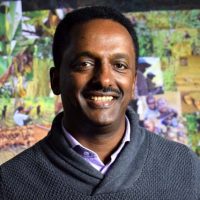Building Resilient Food Systems During COVID-19 and Beyond
Reclaiming Food Sovereignty in Africa post-COVID-19
In this panel, speakers discuss the status of food sovereignty in Africa prior to and emerging from the COVID-19 pandemic, as local communities seek to reclaim and rebuild their food systems following border closures and critical levels of food insecurity. Speakers discuss topics related to valuing and strengthening Indigenous food systems, improving food and nutritional security, and seed sovereignty. Sponsored by CSFS and the Liu Institute Network for Africa.
About the Presenters

Dr. Million Belay
Dr. Million Belay coordinates the Alliance for Food Sovereignty for Africa, a network
of networks of major networks in Africa. He is a member of the International
Panel of Experts on the Sustainable of Food Systems (IPES-Food). Million is a
founder of MELCA – Ethiopia, an indigenous NGO working on issues of agro-
ecology, intergenerational learning, advocacy and livelihood improvement of
local and indigenous peoples. Million has been working over two decades on the
issues of intergenerational learning of bio-cultural diversity, sustainable
agriculture, the right of local communities for seed and food sovereignty and
forest issues.
His main interest is now advocacy on food sovereignty, learning
among generations, knowledge dialogues and the use of participatory mapping
for social learning, identity building and mobilization of memory for resilience.
He has PhD in environmental learning and MsC in tourism and conservation and
BsC in Biology.

Selalelo Mpotokwane
Selalelo Mpotokwane is a Senior Research Scientist at the National Food Technology Research Centre (NFTRC), Botswana. He develops technologies, technical manuals, training materials and standards for the food industry. He is an accredited Trainer.
Selalelo holds an MSc. in Food Science and Technology from the University of Ghent (Belgium), an LLM in Intellectual Property from the University of Turin (Italy) World Intellectual Property Organization (WIPO)/ programme, and a BSc. in Agriculture from the University of Botswana.
Mr. Mpotokwane’s research interests are in developing and commercialising Botswana’s indigenous-raw-material-based foods. He is a task team member on Botswana’s domestication of the CBD’s Nagoya Protocol on Access and Benefit-Sharing (ABS), a notable output being the Drafting Instructions for Botswana’s upcoming ABS Bill. He is a Natural Resources Technical Committee member, and was also a member of the Botswana’s Indigenous Knowledge Systems Policy (IKS) reference group, and the Climate-Smart Agriculture Working Group.

Kefilwe Moalosi
Kefilwe Moalosi is a Nutrition and Food Systems specialist and currently the acting Head of Nutrition under the supervision of the Director of Human Capital and Institutions Development within the African Union Development Agency (AUDA-NEPAD). Her current capacity provides technical
support to Regional Economic Communities (RECs), African Union Member States and Development Partners in planning, programming and implementation of the Global Nutrition Agenda and the African Union Agenda 2063. Her key focus includes scaling up Home Grown School Feeding and other related continental initiatives and programs. She was key in developing the AUDA-NEPAD Nutrition and Food Systems Implementation Strategy (2019-2025). Prior to NEPAD, she served for seven years at the Ministry of Health, Public Health Directorate as Food Safety and Nutrition Officer in Botswana.
She holds an MSc in Food Safety and Quality Management from the University of Greenwich in England and BSc in Food and Nutrition (Food and Consumer Sciences) from Cape Peninsula University of Technology in South Africa.

Dr. Hannah Wittman
Dr. Hannah Wittman’s research examines the ways that the rights to produce and consume food are contested and transformed through struggles for agrarian reform, food sovereignty, and agrarian agriculture. Her projects include community-based research on farmland access, transition to organic agriculture, and seed sovereignty in BC, agro-ecological transition and the role of institutional procurement in the transition to food sovereignty in Ecuador and Brazil, and the role that urban agriculture and farm-to-school nutrition initiatives plan in food literacy education.

Tebogo T Leepile
Tebogo T Leepile from Botswana is in the final stages of her PhD in Integrated Studies in Land and Food Systems under the supervision of Drs Eduardo Jovel and Crystal Karakochuk. Her work broadly focuses on understanding and leveraging the intersections between food environments, nutrition, and health in alleviating food and nutrition vulnerabilities among the less privileged especially women and children. She is also passionate about implementation science, specifically the effectiveness of public policy efforts that seek to bridge the gender gaps in education and agriculture. Tebby is a committed and engaged leader and scholar who continues to serve in different roles across UBC and beyond. Most notably, she co-founded the Liu Network for Africa (LINA), a platform that serves as a focal point for research, discussions, and policy actions on Africa’s governance and development issues.
The Building Resilient Food Systems During COVID-19 and Beyond series is brought to you by the Centre for Sustainable Food Systems (CSFS), the BC Food Web, the Faculty of Land and Food Systems (LFS), and the Royal Bank of Canada. This webinar series focuses on answering fundamental questions about the resiliency of our food system during and beyond COVID-19.
In addition, this episode is co-sponsored by the Liu Institute Network for Africa.




